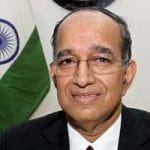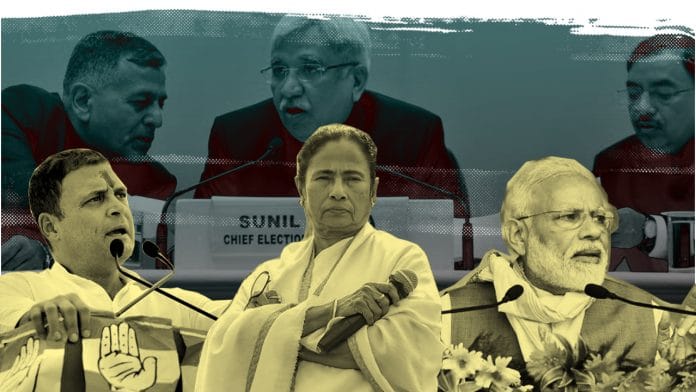Finance minister Arun Jaitley has questioned whether invoking model code of conduct in the complaints against PM Modi to the Election Commission are violative of free speech. “If such speeches are considered by anyone as violative of the MCC, that may actually run the danger of the MCC’s constitutionality in relation to free speech being called into question,” Jaitley said in a blog post Tuesday.
ThePrint asks: Should EC police election speeches or does the poll code impinge on free speech?
IPC laws deal with communal and hate speeches while MCC rules exist to ensure decency in polls
 V.S. Sampath
V.S. Sampath
Former Chief Election Commissioner
The Election Commission is responsible for monitoring the election speeches to ascertain whether they are in compliance with the model code of conduct. This is done to maintain a level-playing field. The MCC has been agreed upon by all political parties, and it is they who have empowered the Election Commission with the mandate to implement the rules. This is not the first Lok Sabha election in which the MCC rules are being implemented.
I do not understand how the MCC is even being pitted against free speech. There are many existing laws under the IPC and others that deal with communal and hate speeches. But the whole point of MCC is to ensure that a certain level of decency and harmony is maintained in public discourse during elections and in campaigning.
It is true that there is a very thin line between free speech and hate speech in election context. But it is the Election Commission’s duty to take that call and distinguish between the two. The EC needs to use its judgment and see if speeches conform to the model code of conduct. Of course, this needs to be done in the most dispassionate, objective and transparent manner possible. It may not be fair to contend that MCC impinges on free speech.
Also read: Why Model Code of Conduct for elections cannot act against offending politicians
EC’s measures for political speeches assume that Indians are not rational or enlightened voters
 Vineeth Krishna
Vineeth Krishna
Senior Associate Editor, Centre for Law and Policy Research
The release of a movie has been stalled. A web series has been ordered to be taken down. Politicians making communally charged speeches have been temporarily banned from campaigning.
The Election Commission’s measures and relevant provisions of the moral code of conduct on political speeches make a profound assumption about the electorate: Indians are not rational or enlightened voters. Instead, they are a flock of sheep, in constant danger of being swayed by a speech here or a movie there. The EC has assumed its role as the shepherd, protecting the flock from the political wolves who appeal to the reptilian brain of the voters.
Maybe it’s time for the EC to take a risk and give the electorate a chance to encounter political speeches, detect bigotry, communalism and jingoism for themselves and make electoral choices.
The EC should step back. We already have a judiciary which has been quite arbitrary in placing restrictions on speech. The last thing we need is another set of potentially arbitrary constraints penned by the Commission – albeit limited to the sphere of elections.
Speech that violates constitutional and statutory provisions can and should be dealt with regular judicial processes. Let the politicians knock themselves out with all other kinds of speeches. Maybe the electorate would respond in ways that politicians don’t expect.
Parties should go to court if they feel an election speech violates both MCC rules and IPC laws
 S.K. Mendiratta
S.K. Mendiratta
Former legal advisor, Election Commission
The Model Code of Conduct has been formulated with the consent of political parties, and the Election Commission is solely responsible for the enforcement of these guidelines. The whole point of having the Election Commission is to implement these rules, and so one can’t complain when the poll body does its duty by monitoring election speeches too closely.
It is an altogether different matter when one accuses the Election Commission of being selective in its implementation. The fact of the matter is, not every complaint which comes to the EC is credible. The complainant needs to bring evidence to the table in the form of newspaper reports and audio/video recordings among other things.
I have often argued that if a particular speech by a politician is found to be violative of both the Model Code of Conduct as well as the Indian Penal Code, then the complainant should go directly to the courts. Why do they wish to go through the Election Commission? Why take a longer route? This not only makes the process more complicated, but it also consumes a lot of time and resources.
Also, several complaints that can be addressed by the state election commissions are needlessly brought to the national Election Commission. This isn’t a correct practice.
Arun Jaitley’s problem with free speech isn’t surprising since divisive politics help BJP win polls
 Shivam Vij
Shivam Vij
Contributing editor, ThePrint
There is no debate on the policing of political speeches in the election season. The Supreme Court of India had settled the debate in January 2017 when it ruled that seeking votes in the name of religion, caste or community is a “corrupt practice” under section 123(3) of The Representation of the People Act.
It is not surprising that finance minister Arun Jaitley of the Bhartiya Janata Party has a problem with this, since the BJP’s election victories come on the back of divisive vote bank politics. What’s ironic is that a BJP leader is worried about free speech. On most days, it is the BJP and its ideological fellow travellers who have a problem with others exercising free speech. They are the first ones to shut people up saying ‘hey, that’s sedition, that’s hurting religious sentiments, that’s anti-national’.
The BJP and the RSS are perpetual “cry-babies” (to use Arun Jaitley’s term for the Congress) when it comes to freedom of speech and expression. They are the first to remind us of the “reasonable restrictions” to the fundamental right of free speech in India. Now the shoe is on the other foot.
If the BJP wants to have a debate on free speech to neutralise the model code of conduct, we’ll have to begin with the BJP’s favourite reasonable restrictions.
Also read: Big split in Election Commission as EC Ashok Lavasa stands up against clean chits to Modi
None of the MCC restrictions on free speech contradicts those already imposed by the Constitution
 Sanya Dhingra
Sanya Dhingra
Principal correspondent, ThePrint
It is a bit rich for a government hurling sedition laws at students to turn around and sermonise the country on free speech.
In India, free speech is not absolute. It is subject to “reasonable restrictions.” According to the Constitution, the state is well within its rights to regulate speech in case it threatens public order, defames someone, or incites an offence. None of the restrictions imposed under the model code of conduct are in contradiction with the restrictions already imposed under Article 19(2) of the Constitution. In that sense, the MCC is a legitimate and collectively agreed upon temporary censorship that falls within the constitutional framework.
The MCC is ultimately only a set of guidelines that are non-binding in nature, unless the EC decides to step in and enforce them. And surely, under Article 324 of the Constitution, the EC can take action against an errant politician with or without the MCC. The MCC’s existence then only ensures that there is a collectively agreed upon lakshman rekha which politicians would not cross even in the heat of bitter campaigning. In the absence of any framework on what qualifies as improper conduct, the EC would be flooded with complaints because politicians would take exception to everything said by their opponents.
While it may be healthy to debate whether the MCC should be subject to free speech or not, to do it only when leaders from one party are under scrutiny for flouting it, raises questions behind the intention of sparking such a debate.
By Fatima Khan, journalist at ThePrint.







Any curb on any sort of thought goes against the notion of citizenship and free will.
Voters/citizens of a democracy need to be exposed to all arguments. The argument that corrosion of the norms of civility is fallacious.
Free speech is the fundamental building block of democracy. Curbs on free speech by laws of sedition and libel reprehensible as they promote majoritarianism and authoritarian leaders.
Well said. Totally agree. Let voters decide.
What happened to simple good taste, the decency and refinement high office enjoins upon its holders …